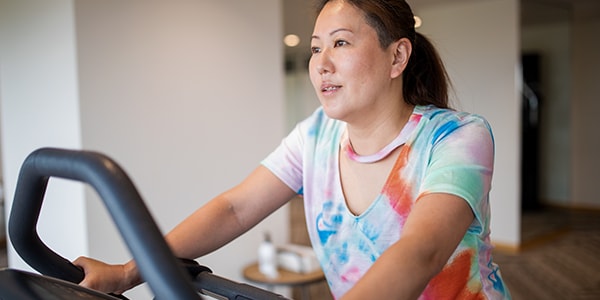Is it okay to exercise when you’re sick?
If you’re feeling sick or recovering from COVID-19, can you exercise or should you rest? We ask a sports medicine expert and a personal trainer for advice.
Cooler weather provides a seasonal window for viruses to sneak in and leave you feeling unwell. So, what happens to that long bike ride or Pilates session when you’re not at your best? Should you push on or pull back? We asked the experts for their advice on whether to exercise when sick.
Am I too sick to exercise?
If you’re keen to keep up your fitness routine but aren’t sure whether you should, there’s 1 general rule to follow: avoid exercise if you have a temperature over 38°C. When you have a fever, your body can’t regulate its temperature effectively and you may lose more fluid than normal, leading to dehydration.
Then there’s COVID-19 to consider. If you have COVID-19 symptoms, get a test and, if it’s positive, follow the current government health guidelines.
Even if you have a regular head cold or feel a bit fluey, you wouldn’t want to pass those germs on to others, so it’s a good idea to stay out of the gym. But should you hit pause on that marathon training run or at-home yoga session just because you have a cold or are not feeling well?
If you don’t feel like exercising when sick, then don’t, is the advice of Libby Babet, former The Biggest Loser Australia trainer and founder of The Upbeat workout studio.
“It’s always best to consult your doctor if you’re unsure of whether to return to exercise or not,” she says.
If you have just a mild cold, Libby says a brisk walk, cycle outdoors or light workout at home can clear your head. “But if you have any more severe symptoms, you should take time off from working out so your body can rest.”
While moderate exercise does help boost general immunity, exercising when you’re sick won’t help you recover faster. In fact, when a study published in the British Journal of Sports Medicine compared 2 groups of people with a cold – the first doing 30 minutes of moderate exercise 5 days a week and the other resting – there was no difference in how long they were sick.

When to opt for a fitness-free day
If you’re feeling less than your personal best but you’re still keen to keep up your fitness routine, mild to moderate physical activity should be okay as long as you don’t have a fever.
“If your symptoms are only above the neck — sneezing or a mild sore throat without a fever — it’s probably okay to exercise sensibly, as long as you’ve excluded COVID-19 infection,” says GP and sports doctor, Dr Gill Cowen.
But if you have more widespread symptoms, medical advice is that you should take the day off.
“If, for example, you have muscle pains, diarrhoea, vomiting or a racing heart at rest, we usually advise against exercise until symptoms have resolved,” says Dr Cowen. “This avoids increased load on your already-stressed cardiovascular system. It also avoids transmitting infections like stomach upsets to others.
“Fever is also thought to reduce endurance and muscle strength while increasing fatigue — the combination of which may increase your risk of injury.”
How to start exercising again after feeling unwell
The after-effects of an illness can last longer than you might expect. If you’re keen to continue your exercise routine but you’re still feeling weak, tired or generally run-down, it’s best to let your body recover before you start tackling the weights section.
“Try a few brisk 20- to 30-minute walks to get the blood pumping again, then build up from there,” says Libby. “If you’re coming back from a very long period of illness, or something quite severe, you may want to enlist a good exercise physiologist or personal trainer with expertise in the area to help guide you back to a place of strength.”
Exercising after COVID-19
The effects of COVID-19 can range from mild, cold-like symptoms to severe illnesses. Exercise is important for recovery, but must be done in a gradually and safely.
“You should consult your doctor prior to recommencing your exercise regimen after being infected with COVID-19, with further assessment and investigation potentially required if COVID symptoms have persisted beyond 7 days,” advises Dr Cowen. “This is especially important if breathlessness or chest pain has been experienced, or there’s an underlying past history of cardiac or respiratory disease.”
Typically, if you’ve only had mild, cold-like symptoms of COVID-19 (and no other medical conditions), you’re advised to take 10 days’ rest from when the symptoms start and be symptom-free for at least 7 days before gradually returning to your daily activities.
“Start the return with mild exertion such as a gentle walk that doesn’t increase the heart rate,” advises Dr Cowen. “Assuming this doesn’t result in any recurrence of symptoms, more brisk activities where the heart rate is elevated but there’s no associated breathlessness can be recommenced. Gradual return to usual recreational exercise is the ultimate aim — in a paced manner.”
Words by Helen Foster and Sara Mulcahy
Updated April 2022
Related articles
How to eliminate exercise excuses
An accredited exercise physiologist breaks down your work out barriers.
Walking versus running?
Here are the benefits of these 2 cardio exercises. Now, you choose.
How to move more at work
Build movement into your everyday for serious health benefits and your future will thank you.